Job description for a service manager: A service manager is an important person in many industries. They make sure that everything runs smoothly and that customers are happy. What a service manager does, the skills they need, their education, and more.
Main Duties of a Service Manager
A service manager has many important duties. These include overseeing operations, managing staff, and ensuring customer satisfaction. Let’s look at these in more detail:
Overseeing Operations
A service manager makes sure everything runs smoothly. This means:
- Monitoring Performance: Checking how well the service team is doing and making sure they meet their goals.
- Setting Standards: Creating rules for the team to follow to ensure good service.
- Improving Processes: Finding ways to make service work better and faster.
- Budget Management: Keeping track of money spent and making sure the service department stays within budget.
Managing Staff
Managing a team is a big part of a service manager’s job. This includes:
- Hiring and Training: Finding the right people for the job and teaching them how to do their tasks well.
- Scheduling: Planning work shifts so there are always enough team members to help customers.
- Motivating: Encouraging the team to do their best and rewarding good work.
- Resolving Conflicts: Handling any disagreements or issues between team members.
Ensuring Customer Satisfaction
Keeping customers happy is crucial for any service manager. They do this by:
- Handling Complaints: Listening to customer problems and finding quick solutions.
- Gathering Feedback: Asking customers for their opinions and using this feedback to improve service.
- Maintaining Quality: Ensuring the service provided is always of the highest quality.
- Building Relationships: Creating strong, positive relationships with customers to keep them coming back.
Skills Needed for a Service Manager
To be a good service manager, you need a variety of skills. Here are the key ones:
Leadership
A service manager must be a good leader. This means:
- Inspiring the Team: Encouraging the team to work hard and do their best.
- Decision Making: Making important decisions quickly and effectively.
- Setting an Example: Showing the team how to act by being a good role model.
Communication
Clear communication is essential for a service manager. This involves:
- Talking Clearly: Explaining things in a way that everyone can understand.
- Listening: Paying attention to what others are saying and responding appropriately.
- Writing Well: Writing clear emails, reports, and other documents.
Problem-Solving
A service manager needs to solve problems quickly. This includes:
- Identifying Issues: Spotting problems before they become big issues.
- Finding Solutions: Coming up with effective ways to fix problems.
- Thinking Creatively: Finding new and creative solutions to difficult problems.
Organization
Being organized helps a service manager keep everything running smoothly. This means:
- Planning Ahead: Making plans for the future to avoid any problems.
- Managing Time: Using time wisely to get everything done.
- Keeping Records: Keeping track of important information and documents.
These skills help a service manager do their job well and ensure the service department runs smoothly.
Education Requirements
To become a service manager, you usually need:
- High School Diploma: This is the basic education you need. It means you have finished high school and learned important skills like reading, writing, and math.
- Bachelor’s Degree: This is a higher level of education you can get after high school. It usually takes four years to complete. You can study business or a similar field. This degree helps you learn more about how to manage and run a business.
- Certifications: These are extra courses you can take to learn more about service management. They are not always required but can help you get a job as a service manager. Certifications show that you have special skills and knowledge in service management.
Experience Needed
You need experience to be a service manager:
- Entry-Level Experience: This means you have worked in service jobs before. These jobs could be in places like stores, restaurants, or offices. Entry-level jobs help you learn how to serve customers and understand the basics of running a service department.
- Supervisory Experience: This means you have led a team for a few years. Supervisory experience is important because it shows you can manage people and help them do their jobs well. In these roles, you might have been a team leader, shift manager, or assistant manager. This experience helps you learn how to solve problems, make schedules, and ensure your team works well together.
By having the right education and experience, you can become a successful service manager.
Industries Hiring Service Managers
Many industries need service managers. These are some of the main ones:
- Automotive: In the automotive industry, service managers work in car service centers. They help make sure cars are fixed and serviced properly. They also make sure customers are happy with the service.
- Hospitality: In the hospitality industry, service managers work in hotels. They make sure guests have a pleasant stay. They oversee the staff, handle guest complaints, and make sure the hotel runs smoothly.
- IT Services: In IT services, service managers work with tech support teams. They help solve computer problems for customers.
- Healthcare: In healthcare, service managers work in hospitals and clinics. They help make sure patients get good care.
- Retail: In retail, service managers work in stores. They help customers with their shopping needs.
Average Salary
The salary for service managers can vary. It usually includes:
- Salary Range: Most service managers earn between $50,000 and $90,000 a year. According to data from Salary.com, the average salary is around $65,172 per year.
- Factors Affecting Salary: Industry, location, and experience. For example, service managers in cities like San Francisco or New York tend to earn higher salaries.
- Benefits: Besides their salary, service managers often get extra benefits. Bonuses, health insurance, and retirement plans.
Daily Tasks
A service manager has many tasks to do every day. Here are some of the most important ones:
- Scheduling Staff: A service manager plans work shifts for the staff. This means making sure there are always enough people working to help customers.
- Handling Customer Complaints: If a customer has a problem or is unhappy, the service manager listens to their complaint and finds a solution to fix it.
- Monitoring Performance: A service manager checks how well the team is doing. This means looking at how quickly and how well the team is helping customers.
- Training Employees: A service manager teaches new skills to employees. This helps the team do their job better and provide good service to customers.
These tasks help make sure everything runs smoothly and that customers are happy with the service they receive.
Work Environment
Service managers work in different places, such as:
Office Settings: In the office, service managers do paperwork and have meetings. They plan and organize the work that needs to be done.
Fieldwork: Sometimes, service managers visit work sites. They check how things are going and make sure everything is working well.
Interaction with Staff and Customers: Service managers talk with staff and customers. They solve problems, answer questions, and make sure everyone is happy.
Career Growth Opportunities
Service managers can grow in their jobs. They have several options:
- Promotions: They can move to higher positions with more responsibilities.
- Additional Training: They can learn new skills and improve their knowledge. This can help them do their job better and prepare for higher roles.
- Lateral Moves: They can try working in different industries. This gives them new experiences and challenges.
Challenges Faced
Service managers face some challenges, like:
- Difficult Customers: They have to handle unhappy customers. This can be tough, but finding good solutions is important.
- Staff Conflicts: Sometimes, team members might not get along. Service managers need to solve these problems to keep the team working well together.
- Keeping Up with Changes: The world changes quickly, and service managers must stay updated with new trends and technologies. This helps them keep their service up-to-date and effective.
Sample Job Description for a Service Manager
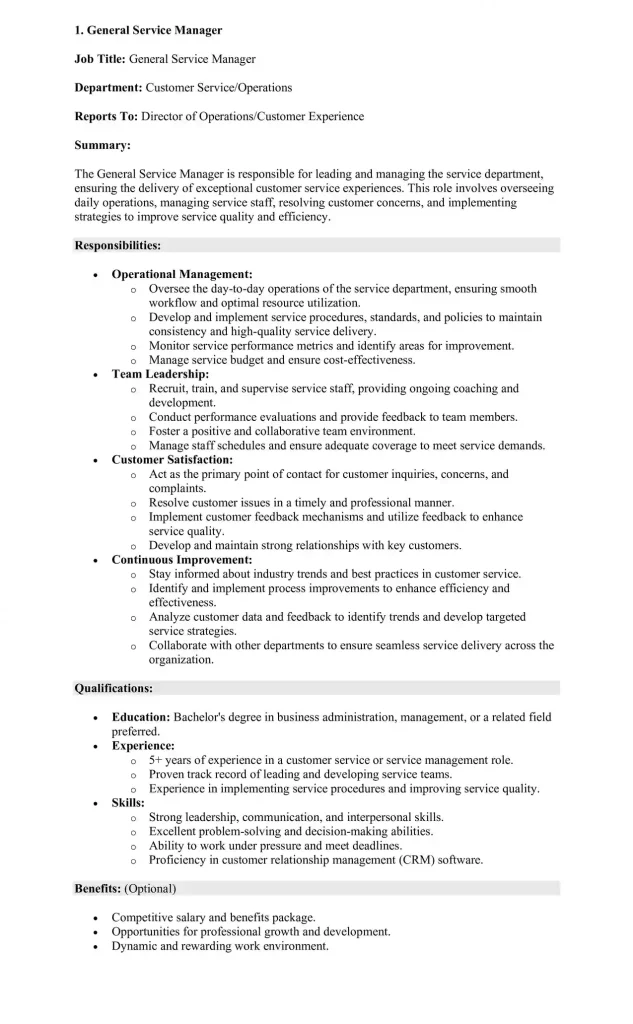
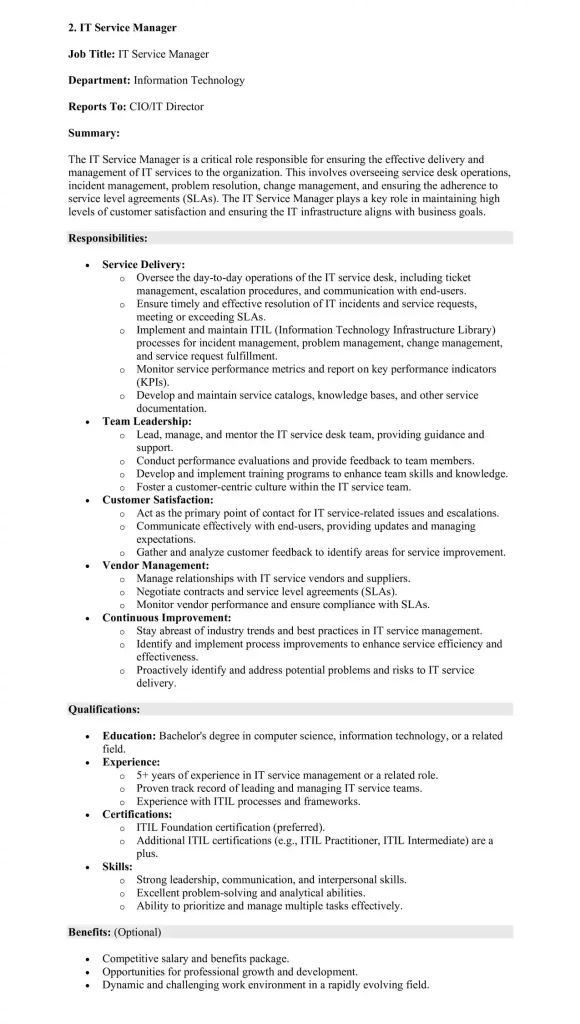
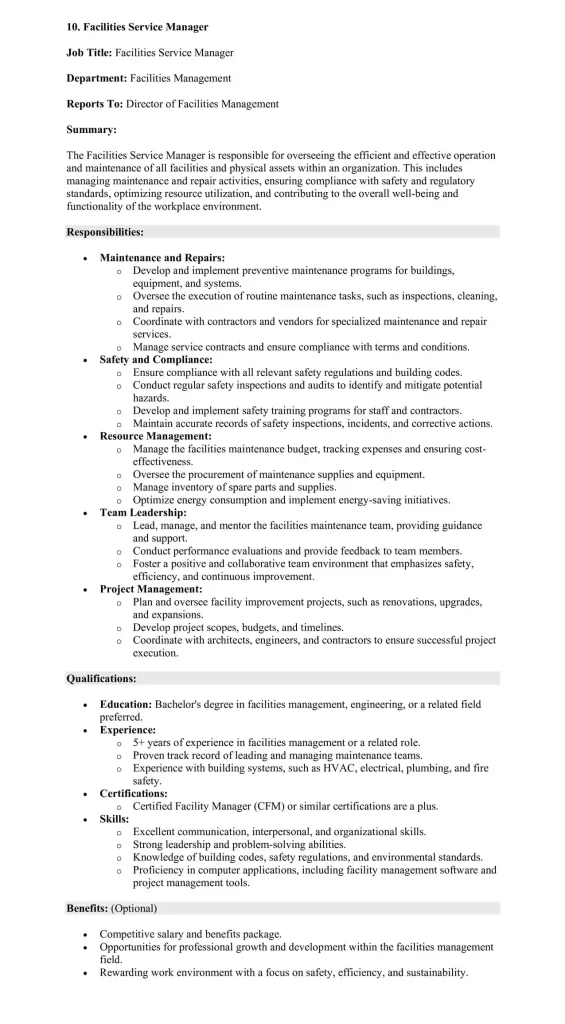
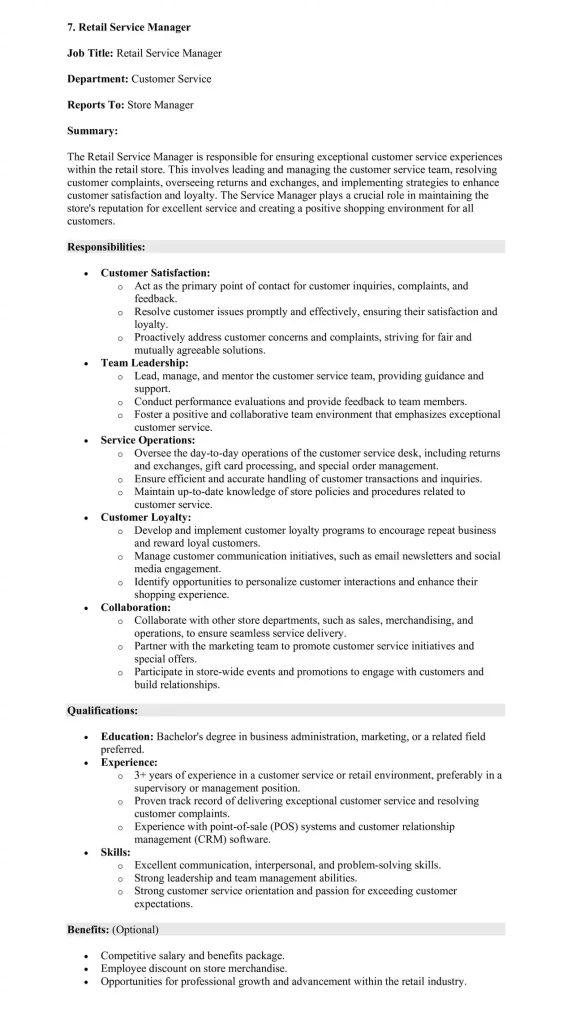
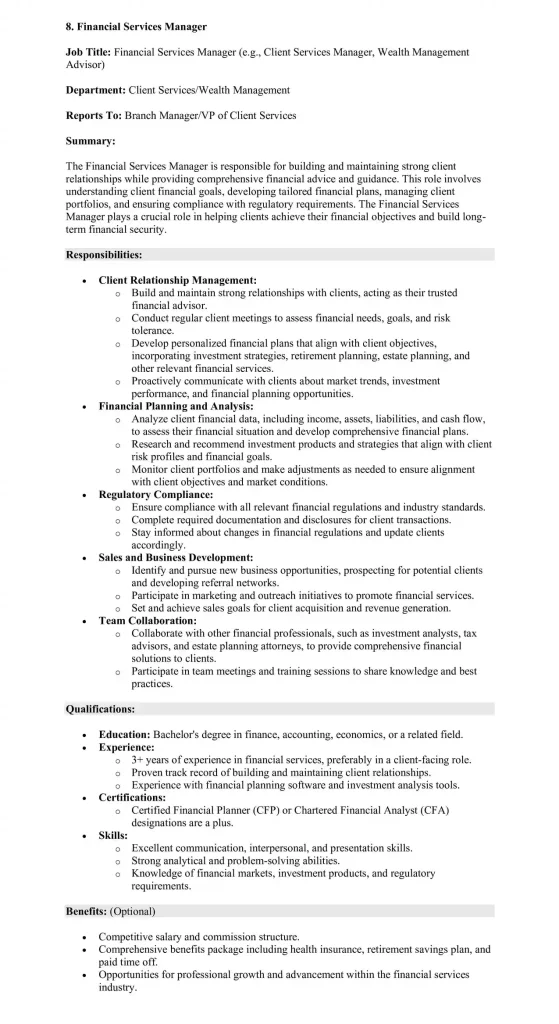
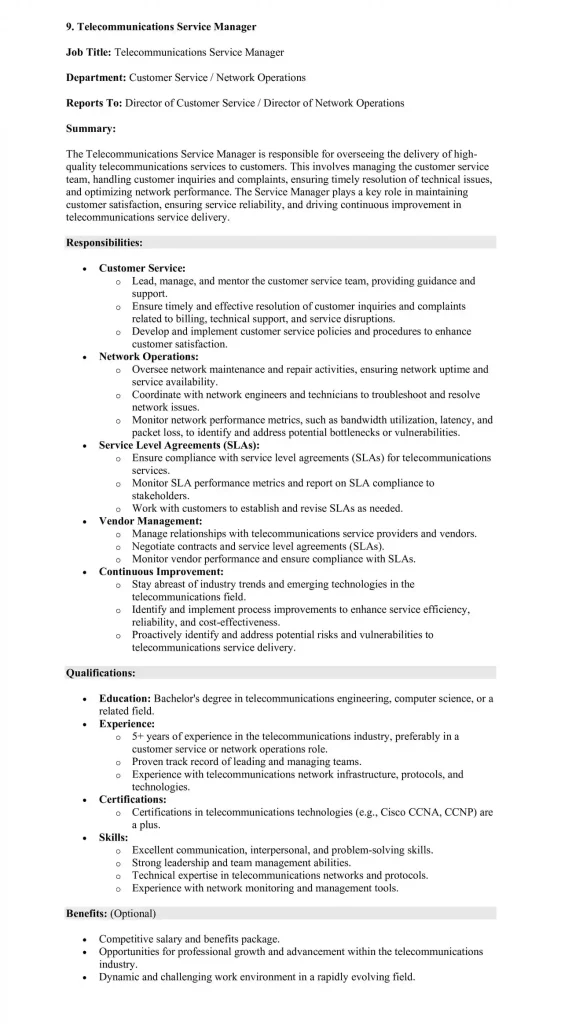
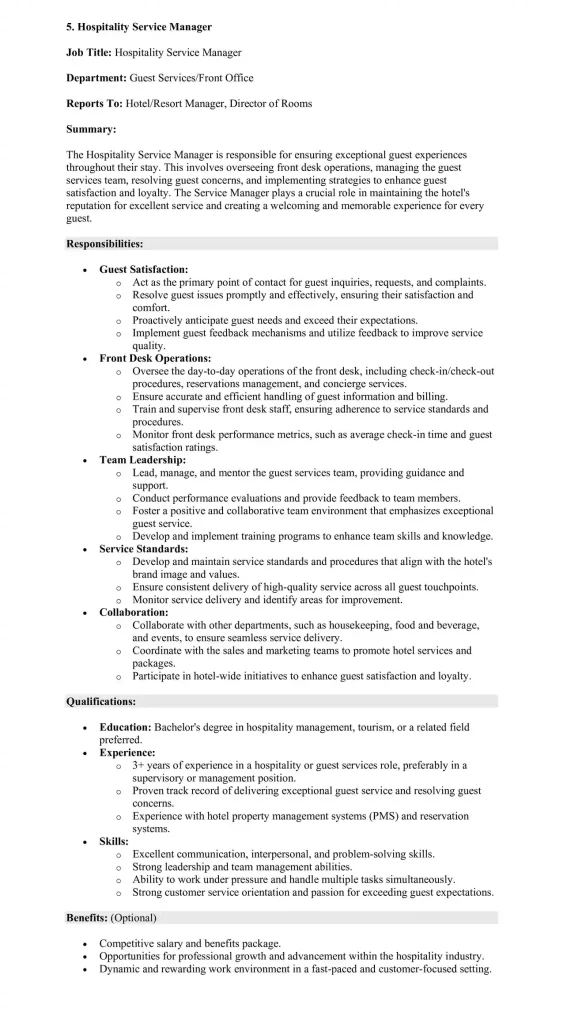
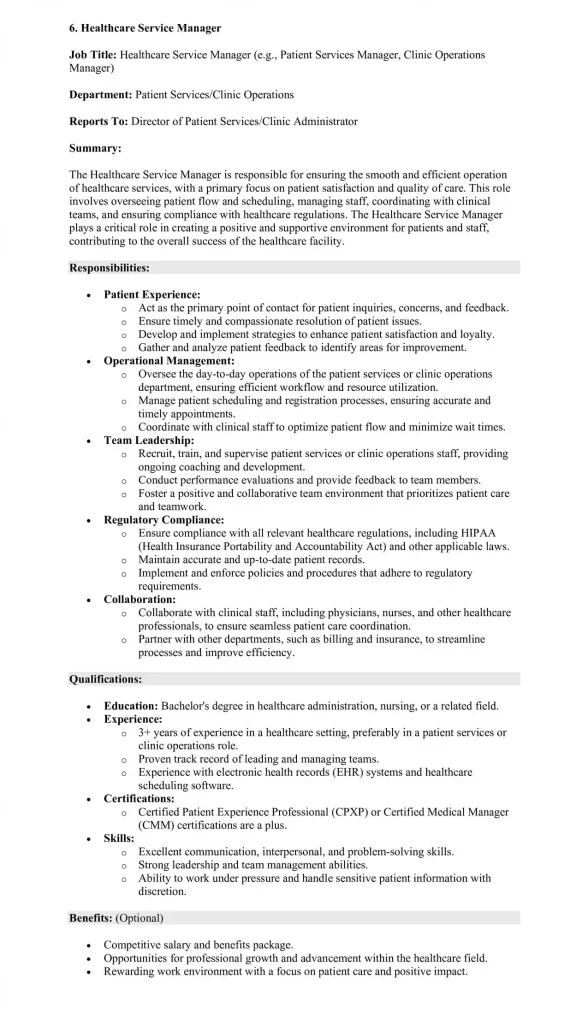
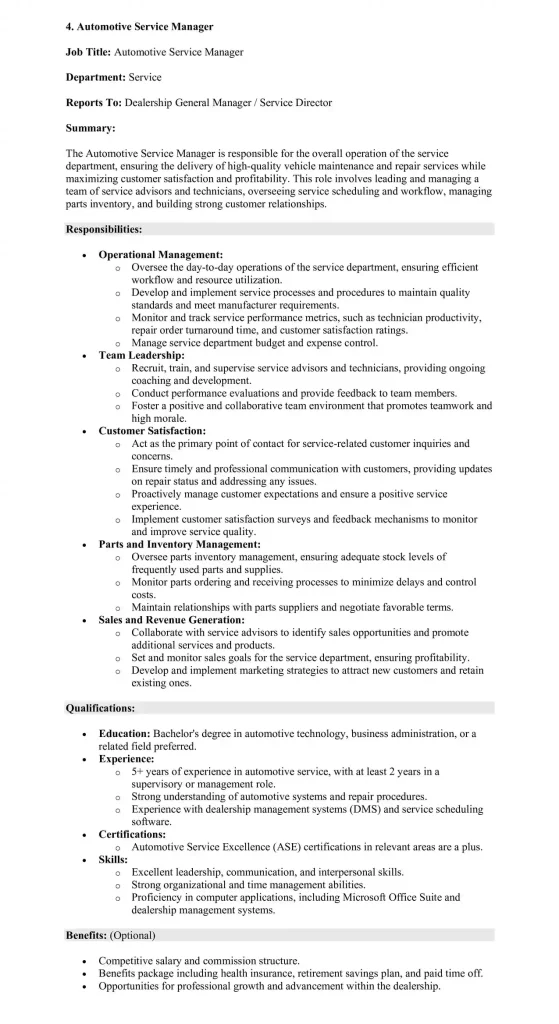
Technological Tools Used
Service managers use various tools to help with their jobs. These tools include:
CRM Systems
These help track customer interactions and data. They can see customer history and preferences, making service more personal.
Project Management Software
This helps organize tasks, set deadlines, and track progress. It ensures projects are completed on time and within budget.
Communication Tools
Email, messaging apps, and video calls help service managers stay in touch with their team and customers.
Industry-Specific Software
Special software for their field, like EHR systems in healthcare.
Customer Feedback Mechanisms
Service managers need to gather and use customer feedback to improve their services. Here are some methods they use:
Surveys
Sent after service to gather customer opinions. This feedback helps identify what works well and what needs improvement.
Feedback Forms
Available in stores or online for customers to share their thoughts anytime.
Social Media Monitoring
Watching social media to see what customers are saying. It also helps address complaints and praise quickly.
Direct Communication
Encouraging customers to speak directly with the service manager to share their feedback ensures concerns are heard and addressed promptly.
Employee Development
Service managers help their employees grow. They focus on:
Training Programs
Regular training sessions help employees learn new skills and improve their performance.
Mentoring
Experienced service managers guide newer employees, providing valuable advice.
Performance Reviews
Regular reviews help employees understand their strengths and areas for improvement. Service managers give feedback and set goals for growth.
Career Path Planning
Helping employees plan their career paths keeps them motivated and shows them growth opportunities within the company.
In conclusion, service managers are vital for keeping services running well and customers happy. They need a mix of skills, education, and experience. With the right qualifications, service managers can have a rewarding career with many growth opportunities

Alexander is a skilled HR expert who writes clear and compelling job descriptions. He has spent over 15 years in the HR field, helping companies find and keep the best employees. With a degree in Human Resources Management from the University of Chicago, he has the knowledge to back up his experience.








